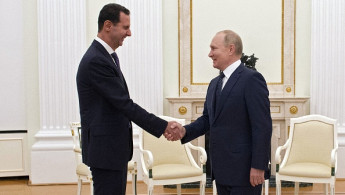Syrian president Assad arrives in Moscow to meet Putin
Syrian President Bashar al-Assad arrived in Moscow on Tuesday on his first official visit outside the Middle East since last month's devastating earthquake, according to a statement from the Syrian Presidency via the Telegram messaging app.
Assad will hold talks with Russian President Vladimir Putin during his visit, alongside a large Syrian ministerial delegation, the statement said.
A Kremlin statement said the two leaders would discuss cooperation in the political, trade and humanitarian spheres "as well as prospects for an overall settlement of the situation in and around Syria".
Russia launched a military campaign in Syria in 2015 that helped to turn the tide in a civil war in favour of Assad with massive aerial bombardment of opposition-held civilian areas.
Military support from the Kremlin helped Assad's regime to regain much of the territory he lost in the first years of civil war after using mass violence to quell peaceful demonstrations across the country in 2011.
Moscow has since expanded its military facilities in the country with a permanent air base at Hmeimim in Syria's Latakia province.
Russia's naval base in the Mediterranean coastal city of Tartous is the Russian navy's only permanent warm water port outside the former Soviet Union.
Western intelligence sources say Russia's costly war in Ukraine has forced it to push some assets from Syria although the country remains Moscow's firmest foothold on the southern flank of NATO.
The visit coincides with the 12th anniversary of the uprising in Syria that began with peaceful demonstrations in March 2011.
The protests turned into an armed revolt after Assad used force to crush the opposition. It spiralled into a multi-sided conflict that has sucked in neighbours and world powers and caused the largest displacement crisis since the Second World War.





 Follow the Middle East's top stories in English at The New Arab on Google News
Follow the Middle East's top stories in English at The New Arab on Google News
![The UAE is widely suspected of arming the RSF militia [Getty]](/sites/default/files/styles/image_330x185/public/2024-11/GettyImages-472529908.jpg?h=69f2b9d0&itok=Yauw3YTG)
![Netanyahu furiously denounced the ICC [Getty]](/sites/default/files/styles/image_330x185/public/2024-11/GettyImages-2169352575.jpg?h=199d8c1f&itok=-vRiruf5)
![Both Hamas and the Palestinian Authority welcomed the ICC arrest warrants [Getty]](/sites/default/files/styles/image_330x185/public/2024-11/GettyImages-2178351173.jpg?h=199d8c1f&itok=TV858iVg)